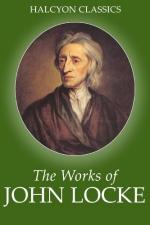
|
| Name: _________________________ | Period: ___________________ |
This test consists of 15 multiple choice questions and 5 short answer questions.
Multiple Choice Questions
1. Which descendant of Adam escapes the flood?
(a) Cain.
(b) Filmer.
(c) Abel.
(d) Noah.
2. What does the rule of having only one king in the world depend upon?
(a) A big kingdom.
(b) The acceptance of paternal authority.
(c) Lots of property.
(d) Obedient sons.
3. What does the basis of government depend upon according to Locke?
(a) The origin of property.
(b) The prevention of cruelty.
(c) The need for order.
(d) The sanctity of marriage.
4. Who are the inheritors?
(a) Eve.
(b) Property owners.
(c) Adam's children Cain and Abel only.
(d) Adam's line and posterity.
5. The king's right to supremacy over subjects is similar to what other power mentioned in the first five chapters of the book?
(a) The head of slaves to other slaves.
(b) Filmer over his followers.
(c) Adam's right to supremacy over his family.
(d) The court jester's desire to flatter the monarch.
6. What does Sir Robert conclude about the use of the term "children of men"?
(a) That the children of men were born to serve.
(b) That it did not pertain to Adam who had no father.
(c) That the children of men would be oppressed.
(d) That the children of men had power over Adam.
7. Who is described by Filmer as possibly having absolute power as a monarch?
(a) Adam.
(b) A property owner.
(c) King James.
(d) Eve.
8. What fact does Locke believe refutes Filmer's claims?
(a) The property owner's rights.
(b) The sovereignty shared between parents.
(c) The slave owner's rights.
(d) The birth of Adam.
9. What happens upon the death of Adam according to Filmer?
(a) Division of authority.
(b) Chaos and anarchy.
(c) Father's estate goes to the eldest son.
(d) Takeover from rival.
10. What are the only two ways that kings can come to power, according to Filmer?
(a) By being the heirs of fathers of people or the heirs of usurpers of power.
(b) Through property ownership.
(c) Through marriage and winning wars.
(d) Through the vote of the people.
11. Who does Filmer think the heir should be?
(a) Someone wise.
(b) Someone with the God-given right to rule over men.
(c) Someone powerful.
(d) Someone strong.
12. What is Filmer's basis for the rule of princes?
(a) That they have the qualifications of good leadership.
(b) That they inherit the kingdoms of their fathers.
(c) That they inherited the right to rule as descendants of Adam.
(d) That they have power and riches.
13. What relationship of power does Locke think is hard to understand?
(a) Fatherhood where children are the property of the father.
(b) Men and women.
(c) Slaves and slave owners.
(d) Kings and queens.
14. What right does Locke believe all men have?
(a) The right to have slaves.
(b) The right to fight.
(c) The right of inheritance.
(d) The right to buy property.
15. What rights does Locke believe that Adam's heir possesses in relation to these creatures?
(a) The same as other men.
(b) More rights than other men.
(c) No rights.
(d) All rights.
Short Answer Questions
1. Who does Filmer attribute the power of fatherhood?
2. Why is it important to explain inheritance in the First Treatise?
3. According to Locke, to whom did God give the power of dominion?
4. What rights does Filmer believe should be given to the descendants of the heir?
5. What does Locke say cannot be inferred from the biblical commandments?
|
This section contains 575 words (approx. 2 pages at 300 words per page) |

|




